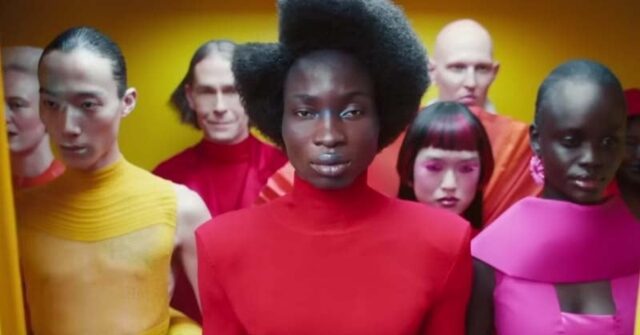Jaguar has recently come under fire for an advertisement that has been labeled as excessively “woke” by critics on social media, particularly conservatives who have drawn comparisons to the controversial Bud Light commercial. The ad, which was posted on Jaguar’s social media platforms, was notable for its complete absence of the brand’s luxury vehicles, instead featuring androgynous models dressed in unconventional and bizarre fashion choices. This shift in marketing strategy has sparked backlash, with many expressing that the ad undermines the brand’s traditional image of powerful and stylish sports cars.
The commercial’s messaging included phrases such as “create exuberant,” “live vivid,” “delete ordinary,” and “break moulds,” with visuals showcasing individuals that subverted conventional gender presentation. The reaction from social media users was immediate and sharp, with comments highlighting a perceived disconnect between the brand’s historical positioning as a maker of “badass muscle cars” and its new marketing direction. Some users expressed that the ad fails to resonate with consumers, emphasizing how such shifts may alienate traditional Jaguar enthusiasts, and others mocked the approach as indicative of a larger cultural trend regarding the embrace of progressive ideals.
Columnist Jon Gabriel commented specifically on the timing of the ad amid changing political climates, suggesting that a recent electoral shift signaled a desire from mainstream America to move away from what he termed “wokeness.” The backlash indicates that audiences are concerned about corporations adopting bold social statements that do not align with their primary business goals. Many took to social media to suggest alternative marketing strategies that would better serve the brand while aligning with consumer preferences, further demonstrating the critical lens through which the public is viewing Jaguar’s latest marketing endeavors.
Notable figures in media and business, including PR consultants and even Elon Musk, voiced their skepticism and critique of this commercial. Musk notably asked if Jaguar still sold cars, prompting a lighthearted yet biting exchange with the company. Such engagements underscore a growing discontent among high-profile consumers and suggest that Jaguar’s marketing strategy may not be resonating even with influential figures in the industry, thereby raising questions about the effectiveness of their new brand direction.
In a press release accompanying the advertisement, Jaguar described this new direction as “a completely transformed Jaguar brand” that aims to recapture the ethos of its founder, Sir William Lyons. The company is set to unveil this new identity at the Miami Art Week with a global installation titled “Copy Nothing,” emphasizing a commitment to artistic expression and innovative design. The strategic pivot appears ambitious, yet it comes at a juncture where the brand faces significant skepticism as reflected in public discourse.
Critics remain wary of Jaguar’s new artistic-oriented approach, arguing that it could be detrimental to the company’s image if it fails to showcase the vehicles for which it is known. The plan to highlight “Exuberant Modernism” and contender for future automotive artistry raises concerns about whether or not this will resonate with traditional car buyers who expect a focus on the vehicles themselves. With mounting criticism intensifying around promotional campaigns lacking substantive connection to product offerings, the automotive giant must navigate its rebranding carefully to avoid further backlash and risk alienating its core customer base.

